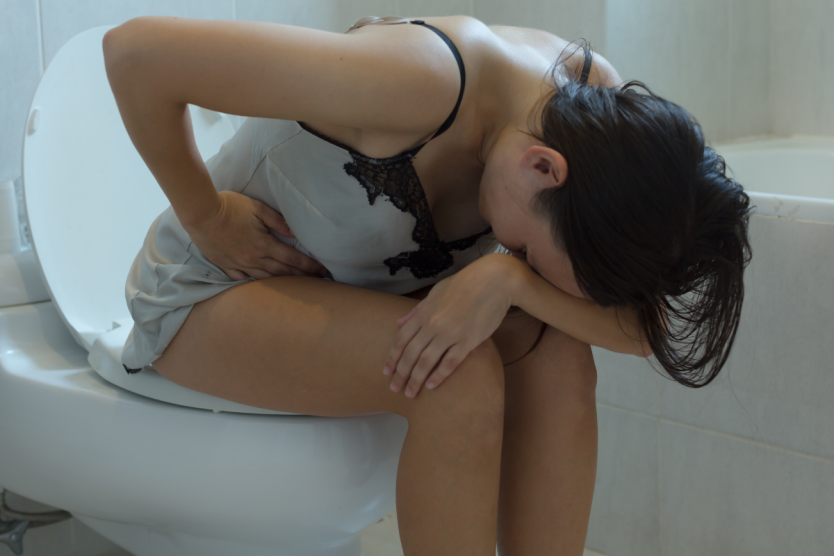Suffering from diarrhea can be embarrassing, inconvenient and limit your desire to be active.
It can also be painful, negatively impact your work, home and social life, and affect you both physically and emotionally. If you’re one of those hit by regular bouts of diarrhea, and you don’t know why, you might be wondering: can pelvic floor dysfunction cause diarrhea?
Pelvic floor dysfunction is the inability to correctly relax and coordinate your pelvic floor muscles to have a bowel movement, and it can lead to a number of conditions.1
Let’s explore pelvic floor dysfunction and whether it may be the cause of your diarrhea.
Pelvic Floor Issues
The muscles of your pelvic floor act like a hammock, holding and supporting your pelvic organs, such as your bladder, uterus, rectum and vagina. When these pelvic floor muscles become too loose or too tight, they can’t support the organs properly, and the ability to control bowel and bladder movements is also impacted.
What are called pelvic floor disorders actually encompass a wide range of conditions caused by dysfunction of those muscles, which can lead to abnormalities in bowel storage or emptying.2 As a result, pelvic floor dysfunction can cause a variety of symptoms.
In the case of tight muscles, it can lead to constipation, straining to defecate, experiencing a frequent need to pee, and difficulty having a bowel movement, or having an incomplete bowel movement.1 Loose muscles can lead to urine or stool that leaks, known as urinary incontinence or fecal incontinence.3 Some reports state that between 2 to 24% of the adult population suffer from bowel incontinence in a year, with 1 to 2% experiencing significant impact on daily activities.4
It can also cause Pelvic Organ Prolapse, when a pelvic organ drops from its normal position, and for women it sometimes causes pain during sex.
Can Pelvic Floor Dysfunction Cause Diarrhea?
If you’re having regular bouts of diarrhea, it may be difficult to find the cause. But one of the reasons could be problems with your pelvic floor.
Those muscles should tighten at the right time to hold stool, allowing you to get to the toilet in time. If the muscles lack strength, endurance and/or control, you may suffer from involuntary loss of stool—known as fecal incontinence—or bowel urgency.5
Another indicator is a marked change in bowel habits. While constipation is often cited, pelvic floor dysfunction can also lead to diarrhea. Other symptoms can include significant bloating and abdominal pain and cramping.3
Can Prolapse Cause Diarrhea?
Pelvic organ prolapse refers to the descent of one or more of the pelvic organs into the vagina due to weakened or damaged supportive structures. Commonly, it’s the bladder, uterus, or rectum that prolapses. While prolapse predominantly leads to symptoms like a sensation of vaginal heaviness, bulging, or discomfort, its association with bowel symptoms is often questioned.
Rectal prolapse, where the rectum descends into or outside the vagina, or rectocele, a prolapse of the rectum into the vaginal wall, can affect bowel function. Women with a significant rectocele might experience difficulties with bowel movements, such as a sensation of incomplete evacuation or the need to manually reduce the bulge to facilitate defecation.
Diarrhea, specifically, is not a direct symptom of prolapse. However, the changes in the anatomy and the associated pressure and discomfort might lead to altered bowel habits. It’s possible that the straining associated with constipation, often seen in prolapse cases, might cause occasional loose stools or a sense of urgency, which can be misinterpreted as diarrhea. Additionally, other conditions like irritable bowel syndrome (IBS) can coexist with prolapse, and IBS can manifest with symptoms including diarrhea.
Treating Pelvic Floor Dysfunction
To determine the condition causing your diarrhea, a doctor will evaluate you with a physical examination, as well as a look at your medical history. That includes anything that may have impacted the pelvic muscles, like pregnancy and childbirth, and a review of your history of bowel patterns, including diarrhea, constipation, or both.2
Depending on your diagnosis, there are several effective treatments for pelvic floor dysfunction. In the case of diarrhea, biofeedback is sometimes useful in retraining pelvic floor muscles to return their coordination.3 Physiotherapy using motor control exercises is another option, used for bowel urgency and/or incontinence of loose stool.5
The primary goal is to rehabilitate your pelvic floor, strengthening the pelvic and anal sphincter muscles and to make sure they are coordinated and functioning. An increase in muscle tone, endurance, and coordination should help create a positive change in bowel function.4
There’s also a chance that your diarrhea is a gastrological condition, so proper diagnosis is vital. Depending on your symptoms and how much pain you feel, you might be treated by your doctor, a physical therapist, a gynecologist, a gastroenterologist, a pelvic pain anesthesiologist, or a pelvic floor surgeon.1
Pelvic floor conditions can become worse if they’re not treated, so it’s important to see a doctor instead of suffering in silence. Most pelvic floor conditions can be treated, and early detection and treatment can help you deal with inconvenient and embarrassing conditions like diarrhea.1
More About Pelvic Floor Dysfunction
Seek Medical Attention
Pelvic floor dysfunction can lead to a number of different health issues, like incontinence and prolapse. It can also cause diarrhea.
If you’re suffering from chronic bouts of diarrhea, or you suspect you have a pelvic floor disorder, seek medical attention. Use our Physician Finder to find a doctor near you with expertise in women’s health, who can help with advice and treatment for pelvic floor conditions.
















